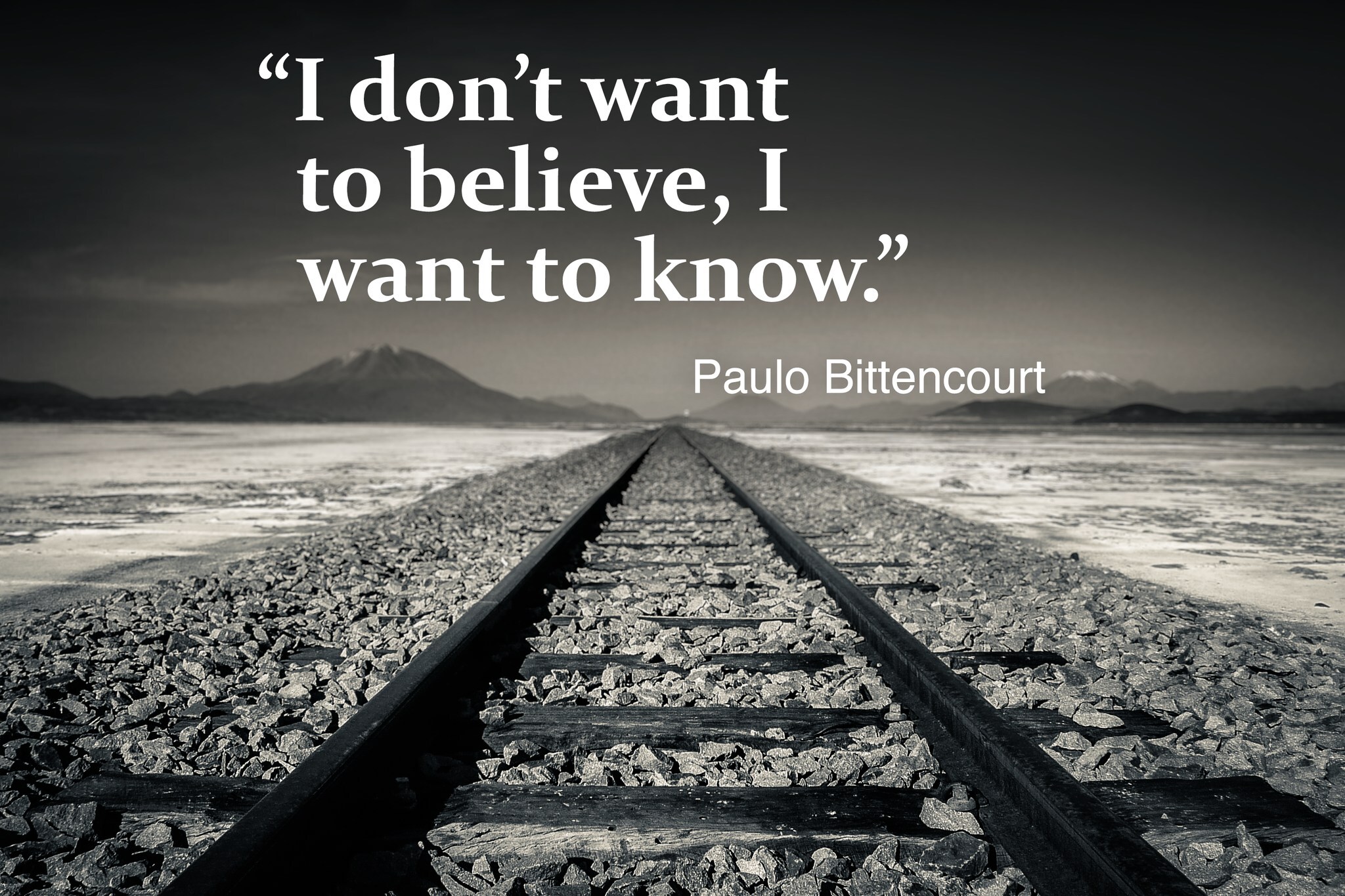Paulo Bitencourt's Blog: Paulo Bittencourt (Freethinker) - Posts Tagged "evolution"
“I don’t want to believe, I want to know.” — Paulo Bittencourt
“I don’t want to believe, I want to know.”
— Paulo Bitencourt
Visit: Atheism, Humanism and Freethought
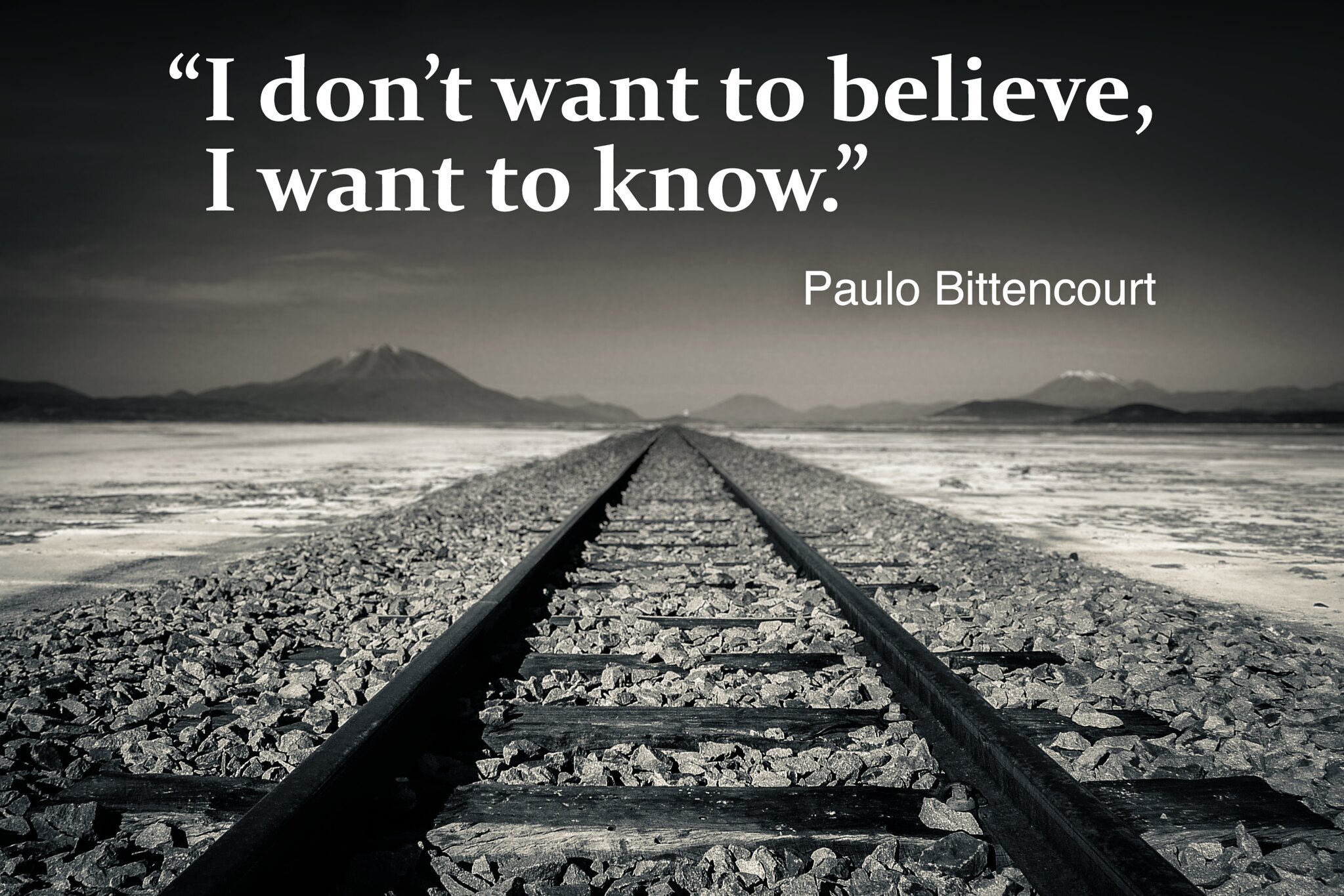
— Paulo Bitencourt
Visit: Atheism, Humanism and Freethought

Published on October 10, 2025 12:02
•
Tags:
atheism, bible, catholic-church, christianity, devil, evangelical, evolution, freethought, god, gospel, hell, humanism, islam, jesus, pastor, pentecostal, philosophy, protestantism, satan
Atheism, Humanism and Freethought
Published on August 06, 2025 01:27
•
Tags:
atheism, bible, catholic-church, christianity, devil, evangelical, evolution, freethought, god, gospel, hell, humanism, islam, jesus, pastor, pentecostal, philosophy, protestantism, satan
“I don’t want to believe, I want to know.” (Paulo Bittencourt)
Published on August 06, 2025 01:33
•
Tags:
atheism, bible, catholic-church, christianity, devil, evangelical, evolution, freethought, god, gospel, hell, humanism, islam, jesus, pastor, pentecostal, philosophy, protestantism, satan
Carl Sagan never said or wrote “I don’t want to believe, I want to know.” The internet is full of misattributions, and this is one of them. The author of this sentence is Paulo Bittencourt, who wrote the book “Liberated from Religion”.
“I don’t want to believe, I want to know.”
— Paulo Bitencourt
Books: Liberated from Religion and Wasting Time on God.
Visit: Atheism, Humanism and Freethought
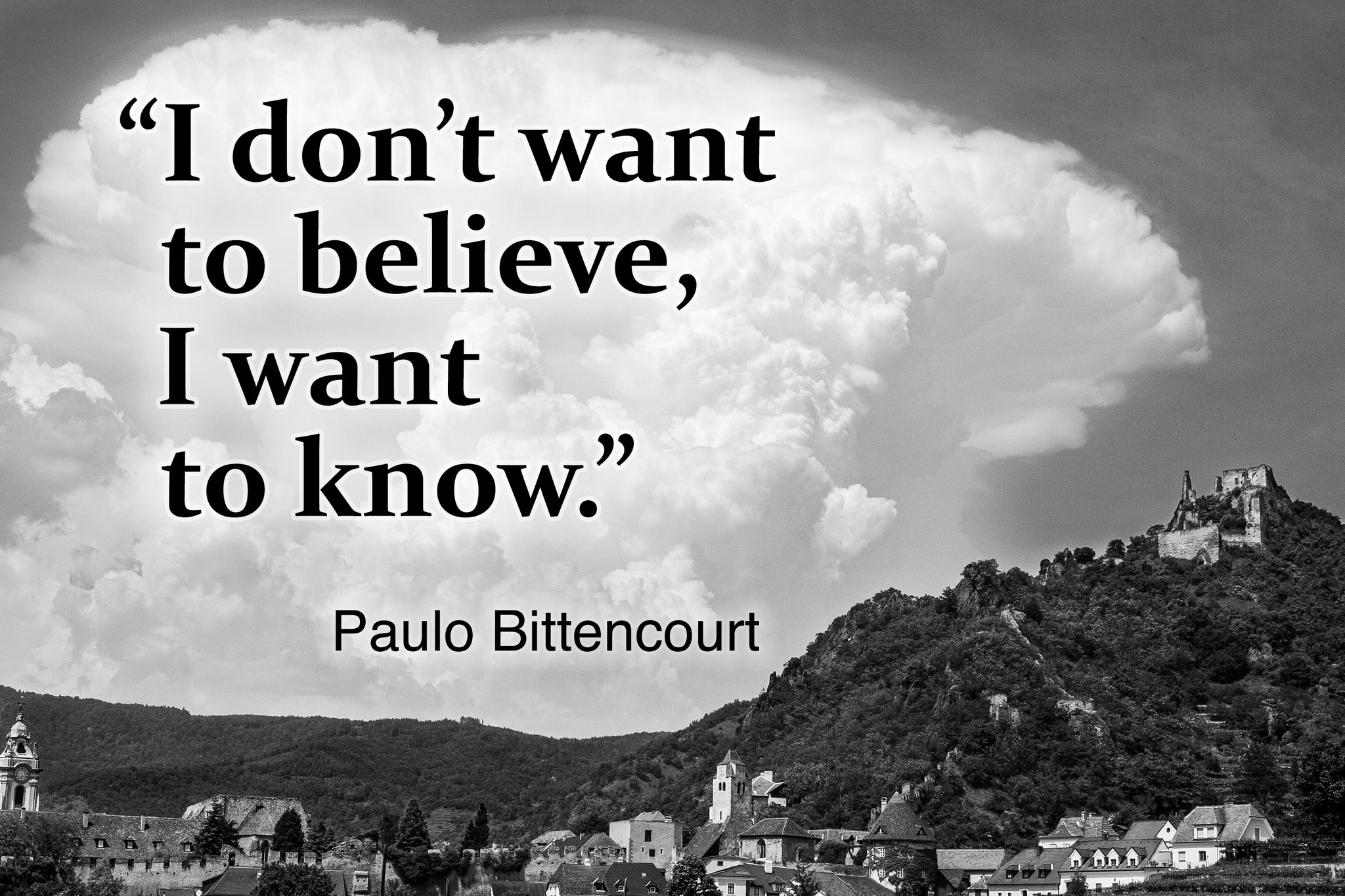
— Paulo Bitencourt
Books: Liberated from Religion and Wasting Time on God.
Visit: Atheism, Humanism and Freethought

Published on October 10, 2025 12:05
•
Tags:
atheism, bible, catholic-church, christianity, devil, evangelical, evolution, freethought, god, gospel, hell, humanism, islam, jesus, pastor, pentecostal, philosophy, protestantism, satan
The quote “I don’t want to believe, I want to know” is not by Carl Sagan, but by Paulo Bittencourt, the author of the books “Liberated from Religion” and “Wasting Time on God”.
“I don’t want to believe, I want to know.”
— Paulo Bitencourt
Author of the books: Liberated from Religion and Wasting Time on God.
Visit: Atheism, Humanism and Freethought

— Paulo Bitencourt
Author of the books: Liberated from Religion and Wasting Time on God.
Visit: Atheism, Humanism and Freethought

Published on October 10, 2025 12:00
•
Tags:
atheism, bible, catholic-church, christianity, devil, evangelical, evolution, freethought, god, gospel, hell, humanism, islam, jesus, pastor, pentecostal, philosophy, protestantism, satan
Read the books “Liberated from Religion” and “Wasting Time on God”, by Paulo Bittencourt
Download the books:
Atheism, Humanism and Freethought
The book “Liberated from Religion” is a critical analysis of religious beliefs and their impact on society. It argues that religion can be a source of oppression, intolerance and violence and that people should be free to choose their own beliefs, without fear of persecution or discrimination. The book also discusses the role of Science and reason in understanding the world and offers a secular perspective on ethics and morality.
Overall, the book is a call for individual freedom and intellectual autonomy, has been well-received and gained popularity among readers interested in Atheism, secularism and critical thinking.
Paulo Bitencourt’s book “Liberated from Religion” is a critical analysis of the role of religion in society and it raises several arguments against religious beliefs and practices. Here are some of the main arguments Bittencourt makes in the book:
1. Bittencourt argues that, throughout History, religion has been used to justify oppression and intolerance towards minorities, women and other groups. He suggests that religion has been responsible for wars, violence and discrimination and that it has a negative impact on society.
2. Bittencourt claims that religious beliefs are based on faith, not evidence, and that they cannot be tested or proven using scientific methods. He argues that this makes religious claims unreliable and unverifiable and that they should not be given the same weight as claims that are supported by evidence.
3. Bittencourt suggests that Science and reason are better ways to understand the world than religion. He argues that Science is based on empirical evidence and rational inquiry and that it provides a more accurate and reliable understanding of reality than religious beliefs.
4. Bittencourt asserts that people should be free to choose their own beliefs, without fear of persecution or discrimination. He suggests that religious freedom should be respected, but that it should not be used to justify intolerance or discrimination towards others.
5. Bittencourt argues that ethics and morality can be based on secular principles, such as human rights, justice and compassion. He suggests that these principles are universal and do not require religious beliefs to be valid.
Overall, Paulo Bittencourt’s book is a call for individual freedom, critical thinking and intellectual autonomy and challenges the role of religion in society.
The book is divided into several chapters, each of which explores a different aspect of religion and its role in society. The topics covered include the origins of religion, the relationship between religion and politics, the impact of religion on morality and the rise of secularism. Bittencourt also discusses his own personal journey towards Atheism and his experiences with religious intolerance in Brazil.
“Liberated from Religion” has received positive reviews and been praised for its clear and engaging writing style, as well as its thoughtful and nuanced analysis of complex issues. The book has been described as a valuable contribution to the ongoing debate about the role of religion in society and the importance of critical thinking and intellectual autonomy.
Paulo Bittencourt’s writing style in “Liberated from Religion” has been praised for its clarity, accessibility and engaging tone and reflects his experience in communicating complex ideas to a general audience. The book has been described as easy to read and understand, even for readers who are not familiar with the topic of Atheism or secularism. Bittencourt uses simple language and avoids technical jargon, making the book accessible to a wide range of readers. He employs a conversational tone in his writing, which helps to create a sense of intimacy and connection with the reader. He shares his personal experiences and reflections throughout the book, which adds a human dimension to the analysis and helps to make the book more relatable.
Overall, Paulo Bittencourt’s writing style in “Liberated from Religion” is engaging, clear and accessible, which makes the book an enjoyable and informative read for anyone interested in the topic of religion and its impact on society.
Paulo Bitencourt’s second book “Wasting Time on God” is a collection of essays and reflections on the author’s journey towards Atheism. In this book, Bittencourt argues that belief in God is a waste of time and that religion is a hindrance to human progress. He explores various philosophical, scientific and cultural arguments against the existence of God, challenges readers to critically examine their own beliefs and argues for the importance of secularism and the separation of church and State. He also discusses the role of religion in society and the challenges faced by atheists in a predominantly religious culture.
----------
In “Wasting Time on God”, Paulo Bittencourt presents a range of philosophical arguments against the existence of God and religion. Some of the key arguments he presents include:
1. Bittencourt argues that the existence of evil and suffering in the world is incompatible with the idea of an all-powerful, all-knowing and perfectly good God. If God were all-powerful, he could prevent evil, if he were all-knowing he would know about it and if he were perfectly good he would want to prevent it. Therefore, the existence of evil suggests that God does not exist.
2. Bittencourt argues that there is no empirical evidence to support the existence of God and that the burden of proof lies with those who claim that God exists. He suggests that the lack of evidence is a strong reason to reject the belief in God.
3. Bittencourt suggests that the fact that God does not reveal himself clearly to all people is evidence against his existence. If God is all-loving and wants people to believe in him, he would make his existence clear and unambiguous.
4. Bittencourt argues that the fact that there are many different religions, each with their own conflicting beliefs and practices, suggests that none of them are true. He suggests that the existence of religious diversity is evidence against the existence of God.
Paulo Bittencourt discusses also other arguments, including the problem of free will, the argument from nonbelief and the argument from the naturalness of Atheism. Overall, Bittencourt’s aim is to challenge readers to critically examine their beliefs and to consider the possibility that God does not exist.
The book “Liberated from Religion” is a critical analysis of religious beliefs and their impact on society. It argues that religion can be a source of oppression, intolerance and violence and that people should be free to choose their own beliefs, without fear of persecution or discrimination. The book also discusses the role of Science and reason in understanding the world and offers a secular perspective on ethics and morality.
Overall, the book is a call for individual freedom and intellectual autonomy, has been well-received and gained popularity among readers interested in Atheism, secularism and critical thinking.
Paulo Bitencourt’s book “Liberated from Religion” is a critical analysis of the role of religion in society and it raises several arguments against religious beliefs and practices. Here are some of the main arguments Bittencourt makes in the book:
1. Bittencourt argues that, throughout History, religion has been used to justify oppression and intolerance towards minorities, women and other groups. He suggests that religion has been responsible for wars, violence and discrimination and that it has a negative impact on society.
2. Bittencourt claims that religious beliefs are based on faith, not evidence, and that they cannot be tested or proven using scientific methods. He argues that this makes religious claims unreliable and unverifiable and that they should not be given the same weight as claims that are supported by evidence.
3. Bittencourt suggests that Science and reason are better ways to understand the world than religion. He argues that Science is based on empirical evidence and rational inquiry and that it provides a more accurate and reliable understanding of reality than religious beliefs.
4. Bittencourt asserts that people should be free to choose their own beliefs, without fear of persecution or discrimination. He suggests that religious freedom should be respected, but that it should not be used to justify intolerance or discrimination towards others.
5. Bittencourt argues that ethics and morality can be based on secular principles, such as human rights, justice and compassion. He suggests that these principles are universal and do not require religious beliefs to be valid.
Overall, Paulo Bittencourt’s book is a call for individual freedom, critical thinking and intellectual autonomy and challenges the role of religion in society.
The book is divided into several chapters, each of which explores a different aspect of religion and its role in society. The topics covered include the origins of religion, the relationship between religion and politics, the impact of religion on morality and the rise of secularism. Bittencourt also discusses his own personal journey towards Atheism and his experiences with religious intolerance in Brazil.
“Liberated from Religion” has received positive reviews and been praised for its clear and engaging writing style, as well as its thoughtful and nuanced analysis of complex issues. The book has been described as a valuable contribution to the ongoing debate about the role of religion in society and the importance of critical thinking and intellectual autonomy.
Paulo Bittencourt’s writing style in “Liberated from Religion” has been praised for its clarity, accessibility and engaging tone and reflects his experience in communicating complex ideas to a general audience. The book has been described as easy to read and understand, even for readers who are not familiar with the topic of Atheism or secularism. Bittencourt uses simple language and avoids technical jargon, making the book accessible to a wide range of readers. He employs a conversational tone in his writing, which helps to create a sense of intimacy and connection with the reader. He shares his personal experiences and reflections throughout the book, which adds a human dimension to the analysis and helps to make the book more relatable.
Overall, Paulo Bittencourt’s writing style in “Liberated from Religion” is engaging, clear and accessible, which makes the book an enjoyable and informative read for anyone interested in the topic of religion and its impact on society.
Paulo Bitencourt’s second book “Wasting Time on God” is a collection of essays and reflections on the author’s journey towards Atheism. In this book, Bittencourt argues that belief in God is a waste of time and that religion is a hindrance to human progress. He explores various philosophical, scientific and cultural arguments against the existence of God, challenges readers to critically examine their own beliefs and argues for the importance of secularism and the separation of church and State. He also discusses the role of religion in society and the challenges faced by atheists in a predominantly religious culture.
----------
In “Wasting Time on God”, Paulo Bittencourt presents a range of philosophical arguments against the existence of God and religion. Some of the key arguments he presents include:
1. Bittencourt argues that the existence of evil and suffering in the world is incompatible with the idea of an all-powerful, all-knowing and perfectly good God. If God were all-powerful, he could prevent evil, if he were all-knowing he would know about it and if he were perfectly good he would want to prevent it. Therefore, the existence of evil suggests that God does not exist.
2. Bittencourt argues that there is no empirical evidence to support the existence of God and that the burden of proof lies with those who claim that God exists. He suggests that the lack of evidence is a strong reason to reject the belief in God.
3. Bittencourt suggests that the fact that God does not reveal himself clearly to all people is evidence against his existence. If God is all-loving and wants people to believe in him, he would make his existence clear and unambiguous.
4. Bittencourt argues that the fact that there are many different religions, each with their own conflicting beliefs and practices, suggests that none of them are true. He suggests that the existence of religious diversity is evidence against the existence of God.
Paulo Bittencourt discusses also other arguments, including the problem of free will, the argument from nonbelief and the argument from the naturalness of Atheism. Overall, Bittencourt’s aim is to challenge readers to critically examine their beliefs and to consider the possibility that God does not exist.
Published on October 02, 2025 00:12
•
Tags:
atheism, bible, catholic-church, christianity, devil, evangelical, evolution, freethought, god, gospel, hell, humanism, islam, jesus, pastor, pentecostal, philosophy, protestantism, satan
“There is no greater pleasure than to be a freethinker.” (Paulo Bittencourt)
“There is no greater pleasure than to be a freethinker.”
— Paulo Bitencourt
Author of the books Liberated from Religion and Wasting Time on God.
Visit: Atheism, Humanism and Freethought
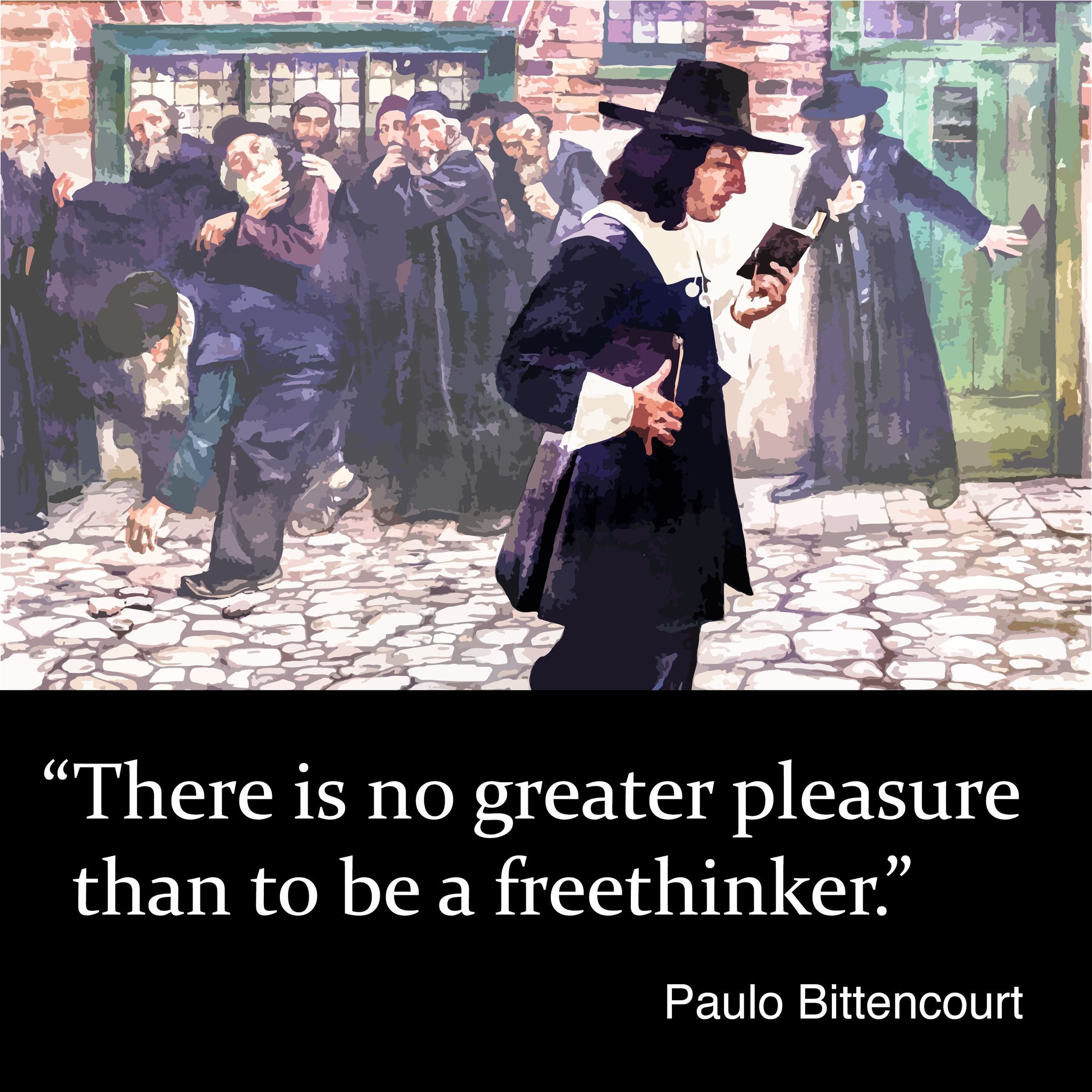
— Paulo Bitencourt
Author of the books Liberated from Religion and Wasting Time on God.
Visit: Atheism, Humanism and Freethought

Published on October 10, 2025 12:06
•
Tags:
atheism, bible, catholic-church, christianity, devil, evangelical, evolution, freethought, god, gospel, hell, humanism, islam, jesus, pastor, pentecostal, philosophy, protestantism, satan
Review of Paulo Bittencourt’s books “Liberated from Religion” and “Wasting Time on God”
★★★★★ “The books by Richard Dawkins, Christopher Hitchens and Sam Harris are good, but when I read them I noticed something: none of these authors have been religious. They grew up in nonreligious households. Then I came across these two books by Paulo Bittencourt: ‘Liberated from Religion’ and ‘Wasting Time on God’. Bitencourt was raised Evangelical and studied Theology to become a pastor, but left the church and later became an atheist. I liked his books much better, because I could feel Bittencourt writes from experience (in addition to his many logical arguments). The only reason why his books are not as famous is because Bitencourt was not born in an English-speaking country. Otherwise, I find his books superior for people who struggle with religion and the belief in God.”
(Review by J. Wood)
Visit: Atheism, Humanism and Freethought

(Review by J. Wood)
Visit: Atheism, Humanism and Freethought

Published on November 01, 2025 02:33
•
Tags:
atheism, bible, catholic-church, christianity, devil, evangelical, evolution, freethought, god, gospel, hell, humanism, islam, jesus, pastor, pentecostal, philosophy, protestantism, satan
“I don’t want to believe, I want to know.” — Paulo Bittencourt (freethinker, humanist and atheist)
Read the books “Liberated from Religion” and “Wasting Time on God”.
For more Atheism quotes by Paulo Bitencourt, visit: https://atheism-bittencourt.github.io...
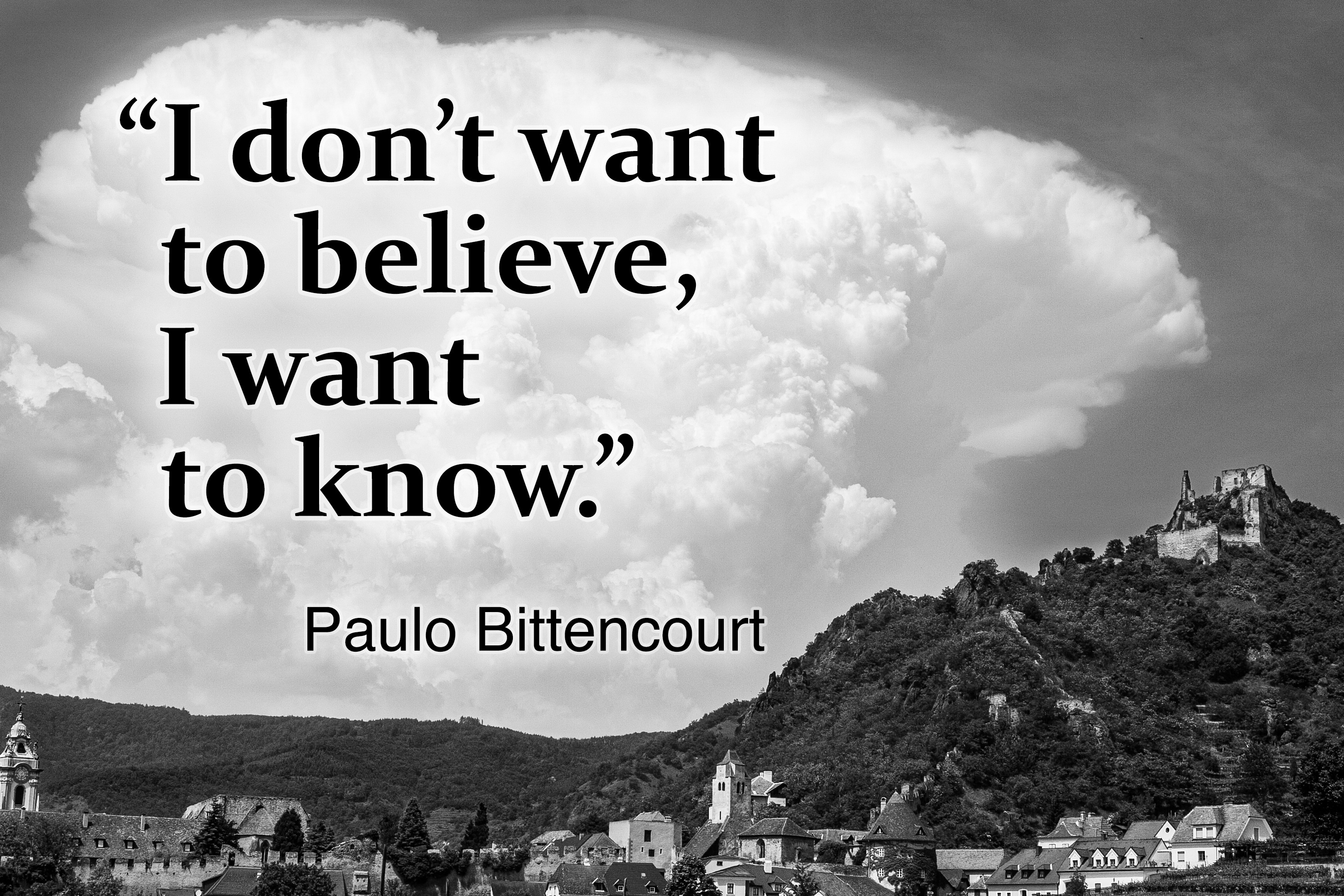
For more Atheism quotes by Paulo Bitencourt, visit: https://atheism-bittencourt.github.io...

Published on October 10, 2025 11:45
•
Tags:
atheism, bible, catholic-church, christianity, devil, evangelical, evolution, freethought, god, gospel, hell, humanism, islam, jesus, pastor, pentecostal, philosophy, protestantism, satan
Paulo Bittencourt (Freethinker)
Author of the books “Liberated from Religion” and “Wasting Time on God”, Paulo Bittencourt was born in Paraná, Brazil, spent his childhood in Rio de Janeiro and studied Theology in São Paulo. Close to
Author of the books “Liberated from Religion” and “Wasting Time on God”, Paulo Bittencourt was born in Paraná, Brazil, spent his childhood in Rio de Janeiro and studied Theology in São Paulo. Close to becoming a pastor, he had doubts, ventured through Europe and ended up settling in Austria. The book “Ethics”, by Bento de Espinosa (Baruch Spinoza), strengthened his skepticism and consolidated him as a freethinker.
Visit: https://atheism-bittencourt.github.io
⎯⎯⎯⎯⎯⎯⎯⎯⎯
Autor dos livros “Liberto da Religião”, “Perdendo Tempo Com Deus” e “Com Zeus Não Se Brinca”, Paulo Bittencourt nasceu no Paraná, passou a infância no Rio de Janeiro e estudou Teologia em São Paulo. Perto de se tornar pastor, teve dúvidas, aventurou-se pela Europa e acabou se radicando na Áustria. O livro “Ética”, de Bento de Espinosa, robusteceu seu ceticismo e o consolidou como livre-pensador.
Visite: https://ateismo-bittencourt.github.io
...more
Visit: https://atheism-bittencourt.github.io
⎯⎯⎯⎯⎯⎯⎯⎯⎯
Autor dos livros “Liberto da Religião”, “Perdendo Tempo Com Deus” e “Com Zeus Não Se Brinca”, Paulo Bittencourt nasceu no Paraná, passou a infância no Rio de Janeiro e estudou Teologia em São Paulo. Perto de se tornar pastor, teve dúvidas, aventurou-se pela Europa e acabou se radicando na Áustria. O livro “Ética”, de Bento de Espinosa, robusteceu seu ceticismo e o consolidou como livre-pensador.
Visite: https://ateismo-bittencourt.github.io
...more
- Paulo Bitencourt's profile
- 8 followers


